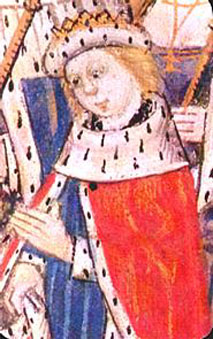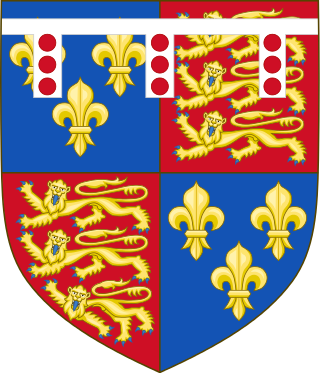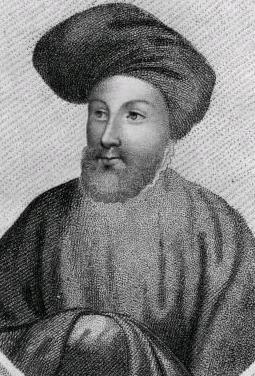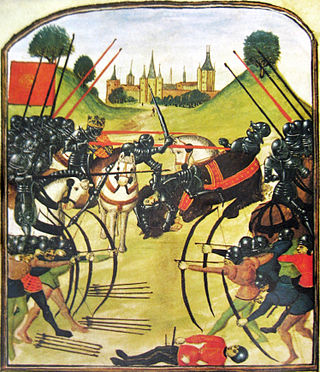See also
- Richard Yorke (1885–1914), British athlete
- Richard of York, 3rd Duke of York (1411–1460), English noble
- Richard of Shrewsbury, Duke of York (1473–1483), English prince
Richard York may refer to:

Richard III was king of England from 26 June 1483 until his death in 1485. He was the last king of the Plantagenet dynasty and its cadet branch the House of York. His defeat and death at the Battle of Bosworth Field, the last decisive battle of the Wars of the Roses, marked the end of the Middle Ages in England.
Year 1460 (MCDLX) was a leap year starting on Tuesday of the Julian calendar, the 1460th year of the Common Era (CE) and Anno Domini (AD) designations, the 460th year of the 2nd millennium, the 60th year of the 15th century, and the 1st year of the 1460s decade.

Edward V was King of England from 9 April to 25 June 1483. He succeeded his father, Edward IV, upon the latter's death. Edward V was never crowned, and his brief reign was dominated by the influence of his uncle and Lord Protector, the Duke of Gloucester, who deposed him to reign as King Richard III; this was confirmed by the Act entitled Titulus Regius, which denounced any further claims through his father's heirs.

Edward IV was King of England from 4 March 1461 to 3 October 1470, then again from 11 April 1471 until his death in 1483. He was a central figure in the Wars of the Roses, a series of civil wars in England fought between the Yorkist and Lancastrian factions between 1455 and 1487.

Henry VI was King of England from 1422 to 1461 and again from 1470 to 1471, and disputed King of France from 1422 to 1453. The only child of Henry V, he succeeded to the English throne at the age of nine months upon his father's death, and succeeded, disputedly, to the French throne on the death of his maternal grandfather, Charles VI, shortly afterwards.

Elizabeth Woodville, later known as Dame Elizabeth Grey, was Queen of England from her marriage to King Edward IV on 1 May 1464 until Edward was deposed on 3 October 1470, and again from Edward's resumption of the throne on 11 April 1471 until his death on 9 April 1483. She was a key figure in the Wars of the Roses, a dynastic civil war between the Lancastrian and the Yorkist factions between 1455 and 1487.

Richard of York, 3rd Duke of York, also named Richard Plantagenet, was a leading English magnate and claimant to the throne during the Wars of the Roses. He was a member of the ruling House of Plantagenet by virtue of being a direct male-line descendant of Edmund of Langley, King Edward III's fourth surviving son. However, it was through his mother, Anne Mortimer, a descendant of Edward III's second surviving son, Lionel of Antwerp, that Richard inherited his strongest claim to the throne, as the opposing House of Lancaster was descended from John of Gaunt, Duke of Lancaster, the third surviving son of Edward III. He also inherited vast estates and served in various offices of state in Ireland, France and England, a country he ultimately governed as Lord Protector during the madness of King Henry VI.

The House of York was a cadet branch of the English royal House of Plantagenet. Three of its members became kings of England in the late 15th century. The House of York descended in the male line from Edmund of Langley, 1st Duke of York, the fourth surviving son of Edward III. In time, it also represented Edward III's senior line, when an heir of York married the heiress-descendant of Lionel, Duke of Clarence, Edward III's second surviving son. It is based on these descents that they claimed the English crown. Compared with its rival, the House of Lancaster, it had a superior claim to the throne of England according to cognatic primogeniture, but an inferior claim according to agnatic primogeniture. The reign of this dynasty ended with the death of Richard III of England at the Battle of Bosworth Field in 1485. It became extinct in the male line with the death of Edward Plantagenet, 17th Earl of Warwick, in 1499.

Cecily Neville was an English noblewoman, the wife of Richard, Duke of York (1411–1460), and the mother of two kings of England—Edward IV and Richard III. Cecily Neville was known as "the Rose of Raby", because she was born at Raby Castle in Durham, and "Proud Cis", because of her pride and a temper that went with it, although she was also known for her piety. She herself signed her name "Cecylle".
Cornwall is a county in the south west of England.

Duke of York is a title of nobility in the Peerage of the United Kingdom. Since the 15th century, it has, when granted, usually been given to the second son of English monarchs. The equivalent title in the Scottish peerage was Duke of Albany. However, King George II and King George III granted the titles Duke of York and Albany.

Edward, 2nd Duke of York, was an English nobleman, military commander and magnate. He was the eldest son of Edmund of Langley, 1st Duke of York, and a grandson of King Edward III of England. He held significant appointments during the reigns of Richard II, Henry IV, and Henry V, and is also known for his translation of the hunting treatise The Master of Game. He was killed in 1415 at the Battle of Agincourt, whilst commanding the right wing of the English army.

The title of Earl of Ulster has been created six times in the Peerage of Ireland and twice in the Peerage of the United Kingdom. Since 1928, the title has been held by the Duke of Gloucester and is used as a courtesy title by the Duke's eldest son, currently Alexander Windsor, Earl of Ulster. The wife of the Earl of Ulster is known as the Countess of Ulster. Ulster, one of the four traditional provinces of Ireland, consists of nine counties: six of these make up Northern Ireland; the remainder are in the Republic of Ireland.
King Richard normally refers to the three English monarchs.

The House of Plantagenet was a royal house which originated in Anjou. The name Plantagenet is used by modern historians to identify four distinct royal houses; the Angevins, who were also Counts of Anjou; the main line of the Plantagenets following the loss of Anjou; and the houses of Lancaster and York, the Plantagenets' two cadet branches. The family held the English throne from 1154, with the accession of Henry II, until 1485, when Richard III died.
Events from the year 1449 in Ireland.
Events from the 1450s in England.

The Wars of the Roses (1455–1487), known at the time and for more than a century after as the Civil Wars, was a series of civil wars fought over control of the English throne in the mid-to-late fifteenth century. These wars were fought between supporters of two rival cadet branches of the royal House of Plantagenet: Lancaster and York. The wars extinguished the last male line of the House of Lancaster in 1471, leading to the Tudor family inheriting the Lancastrian claim to the throne. Following the war and the extinction of the last male line of the House of York in 1485, a politically arranged marriage united the Houses of Lancaster and York, creating a new royal dynasty which inherited the Yorkist claim as well, thereby resolving the conflict.
Richard Duke (1658–1711) was an English poet.